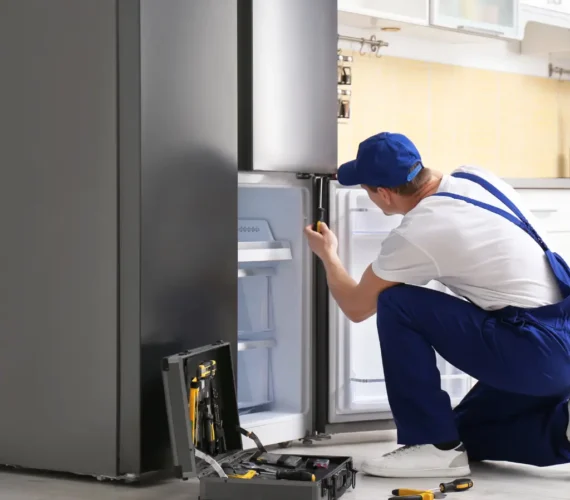
Refrigerator Repair: Comprehensive Guide to Troubleshooting and Maintenance
A refrigerator is a cornerstone appliance in every home, ensuring that food stays fresh and drinks remain cool. However, like all appliances, refrigerators can experience issues that require attention. This guide offers a deep dive into refrigerator repair, helping homeowners troubleshoot common problems, maintain optimal performance, and know when to call a professional.
Common Refrigerator Problems and DIY Solutions
1. Refrigerator Not Cooling
One of the most common issues is when the refrigerator fails to cool properly.
Causes and Solutions:
- Dirty Condenser Coils: Dust and debris can accumulate on the coils, reducing efficiency.
Fix: Unplug the fridge, locate the coils (usually at the back or bottom), and clean them with a vacuum or brush. - Faulty Evaporator Fan: The fan circulates cold air throughout the fridge.
Fix: Listen for unusual noises; if the fan isn’t spinning, it may need replacement.
2. Water Leaks
Water pooling under or inside the refrigerator is often due to drainage issues.
Causes and Solutions:
- Clogged Defrost Drain: Debris can block the drain, causing water to back up.
Fix: Flush the drain with warm water and use a pipe cleaner to clear blockages. - Damaged Water Line: Cracks or leaks in the water line can cause dripping.
Fix: Inspect the line for damage and replace if necessary.
3. Excessive Noise
A noisy refrigerator can be annoying and signal underlying issues.
Causes and Solutions:
- Worn-Out Motor: The evaporator or condenser fan motor may wear out over time.
Fix: Replace the motor if it’s making unusual noises. - Leveling Issues: An uneven refrigerator can cause vibrations.
Fix: Adjust the leveling feet to ensure the appliance is stable.
4. Frost Buildup
Excess frost can compromise the efficiency of the refrigerator and freezer.
Causes and Solutions:
- Faulty Door Seal: A broken or loose seal allows warm air to enter.
Fix: Check the gasket for cracks or wear and replace if necessary. - Defrost System Failure: A malfunctioning defrost timer, heater, or thermostat may need attention.
Fix: Test each component and replace faulty parts.
Essential Refrigerator Maintenance Tips
Preventive maintenance can extend the life of your refrigerator and save on repair costs.
1. Regular Cleaning
- Clean Coils: Ensure the condenser coils are free of dust every six months.
- Wipe Down Interior: Use a mild detergent to clean shelves and drawers regularly.
2. Check Door Seals
A loose or damaged seal can waste energy. Ensure the gasket is tight and replace it if necessary.
3. Maintain Optimal Temperature
Keep the refrigerator temperature between 35°F and 38°F and the freezer at 0°F for optimal food storage.
4. Organize and De-Clutter
Avoid overloading the refrigerator to allow for proper airflow and efficient cooling.
When to Call a Professional
While many refrigerator issues can be resolved with basic troubleshooting, some problems require expert attention:
- Refrigerant Leaks: Only certified technicians should handle refrigerant-related issues.
- Compressor Problems: If the compressor fails, it often needs professional replacement.
- Electrical Issues: Malfunctions in the control board or wiring are best handled by professionals.
Choosing the Right Refrigerator Repair Service
When seeking professional help, consider the following:
1. Experience and Certification
Look for technicians certified by organizations like the EPA or NATE.
2. Customer Reviews
Check online reviews and ratings to gauge customer satisfaction and service quality.
3. Warranty and Guarantees
Choose a repair service that offers warranties on parts and labor.
Final Thoughts
A well-maintained refrigerator can last for years, providing consistent performance and energy efficiency. Regular maintenance and prompt attention to issues can prevent costly repairs. When in doubt, don’t hesitate to call a professional to ensure your appliance is running at its best.
